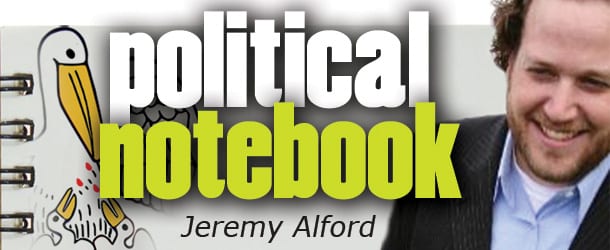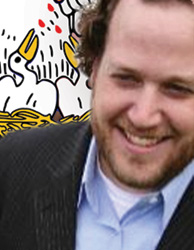Staring down his final year in one of Louisiana’s most influential political positions, House Speaker Chuck Kleckley, R-Lake Charles, is pondering his next move. While he’s had one post in mind for a while, another one came into view recently when Treasurer John Kennedy confirmed to LaPolitics that he was mulling over a run for attorney general.
“Based on the number of phone calls I’ve received since John Kennedy made that statement, I think treasurer is definitely something I would consider,” Kleckley said. “But I’ve also had several people back home asking me to consider running for mayor when Randy Roach’s term ends.”
That would be in 2017, giving Kleckley an entire year to give the idea a spin.
Kleckley’s successor in the state House would take office in January, 2016.
“Right now my main focus is on the 2015 legislative session,” Kleckley said. “Then I can focus more on what my political future might look like.”
Kleckley Spearheads Tax Study
As the public conversation about tax incentives grows louder, and lawmakers move closer to the term-ending fiscal session of 2015, pressure is building for a comprehensive tax study — one that would be overseen by Louisiana State University and partly underwritten by the state.
Headed up by Dr. Jim Richardson, an economist from the flagship university, the study would offer a thorough review of Louisiana’s tax structure. It’s already well underway.
“Right now we plan to put out a summary of recommendations in early March,” Richardson told LaPolitics.
House Speaker Chuck Kleckley, R-Lake Charles, who spearheaded the effort, said the summarized findings will likely be presented to a joint meeting of the House Ways and Means Committee and the Senate Revenue and Fiscal Affairs Committee.
The full study will be released as a book over the summer. The book may be published by the LSU Press.
Richardson is staying mum on the details, but said it’s likely that the recommendations will include some kind of plan for a common local sales tax base. “In the end, that has to be the situation. The question is how to get there,” he said.
Internet sales and how to tax them will be an interesting topic as well, he said. Both sides are offering their arguments. “We should maybe put a moratorium on some of these exemptions because they tend to grow so much,” Richardson said.
There were early hints that the study might yield some ideas for the 2015 session. But now those involved believe it will serve as more of a guiding document for the candidates for governor to either plot a special session or plan for 2017 — the next regular session during which tax policies can be introduced.
“I would be surprised if any of the suggestions are taken up during the next session,” Richardson said. “For starters, the governor would need more time to look at them.”
This will be the second major tax study Richardson has overseen for the state. The first came in 1987, when almost all the frontline gubernatorial candidates signed on to support the study’s findings. In the 1990s, some lawmakers were still using the study as a blueprint for updating and changing tax laws.
Geymann Would Support Special Session
It’s probably not going to happen, according to House Speaker Chuck Kleckley, R-Lake Charles, but lawmakers are talking about the need for two different special sessions ahead of the regular session that begins April 13.
With PARCC (Partnership for Assessment of Readiness for College and Careers) exams scheduled for March, lawmakers are worried that they may miss an important opportunity to do something about Common Core.
“I would support it,” said Rep. Brett Geymann, R-Lake Charles, one of the leading opposition voices. “You won’t have all of those external issues to deal with like you see in a regular session.”
But other lawmakers who are in agreement with the need for a Common Core session contend they wouldn’t even know what to include in a petition to call it, or if the state is technically connected to the PARCC exams.
“I communicated with the administration about it,” said a lawmaker. “They didn’t exactly jump at the idea.”
On another front, Rep. Joe Harrison, R-Napoleonville, has initiated an official petition for a special session to be called to address budget issues. With a budget deficit that’s $1.4 billion and growing, he said the Legislature needs to get a handle on the situation before it balloons.
“Our deficit is increasing with the daily drop in oil prices, and our reluctance to have oversight of the numerous exemptions is jeopardizing the financial security of our state,” Harrison said.
Kleckley responded: “Everything that Joe is asking for can be done in a regular session. I don’t see a need to call a special session, especially due to what the expenses would be.”
Miguez Packs During Interview
According to several sources, those who interviewed legislative candidate Blake Miguez for the Louisiana Assoc. of Business and Industry’s endorsement last year got a big surprise during the Q&A section.
The candidate in Southwest Louisiana’s House District 49 is a champion speed shooter. He’s appeared on the History Channel’s show Top Shot.
When he was asked by LABI officials during the interview if he was packing, Miguez nodded his head and tapped at his waist. “I wasn’t sure how this meeting would go,” he said to laughter.
Miguez, who lives in New Iberia, received the WestPAC endorsement, and qualified. Also running is John Bering of Jeanerette, a fellow Republican.
One Bollinger Replaces Another On Regents
The Bollinger family of Lafourche Parish not only has a growing legacy state in politics and shipbuilding, but also, as it seems, with education policy.
On the Board of Regents, 14 out of the 15 members are appointed by the governor to overlapping six year-terms. Charlotte Bollinger was last appointed in 2008, which means she is rotating off. But Gov. Bobby Jindal announced last week that Chris Bollinger, the former president of Bollinger Shipyards (Ben Bordelon, the founder’s grandson, took over in late December), will be coming on.
Also added to the board was Claudia Adley, the vice president and co-owner of Pelican Gas Management and a partner with Adley Consultants. When policy fights erupt at the Capitol during her service, she’ll be able to turn to a very good friend, her husband, Sen. Robert Adley, R-Benton.
Democrat-Republican Runoff Predicted
Louisiana’s open primary system allows for all candidates, regardless of party, to run on a single ballot. In races for governor, this system has traditionally created a runoff between a Republican and a Democrat.
If the current field of four established candidates, with just one Democrat running, has not changed come this fall, that pattern will repeat itself — that’s according to a poll of 600 likely voters conducted in late 2014 by Southern Media and Opinion Research (SMOR).
Against the other declared candidates for governor, U.S. Sen. David Vitter of Metairie, a Republican, leads in the SMOR poll with 36 percent.
He’s followed by state Rep. John Bel Edwards of Amite, the lone Democrat, at 26 percent.
The two other Republicans trailed, with Lt. Gov. Jay Dardenne of Baton Rouge at 19 percent and Public Service Commissioner Scott Angelle of Breaux Bridge at 3 percent.
The undecided vote totaled 16 percent.
Should another major Democrat get in the race, however, Edwards may have a tougher time holding on to his projected 26 percent. The addition of a second Democrat could, in turn, create an all-GOP runoff such as the ones Louisiana saw in recent elections in the 5th Congressional District in 2013 and the race for lieutenant governor in 2011.
Qualifying for governor takes place in early September, followed by an October primary and a November runoff if needed.
Asked what the top issue should be for the next governor, voters once again confirmed Vitter’s thinking on making Common Core, and to a larger extent, education policy, central to his early policy narrative. The leading category, at 35 percent, was education, schools and teachers; followed by the economy and jobs at 26 percent. Vitter’s current opposition to Common Core links him to education in the public mind.
Should the race pit one party against another, the poll suggests it could be a repeat of the 2014 U.S. Senate race, in which incumbent Mary Landrieu, a New Orleans Democrat, lost her seat to Congressman Bill Cassidy, a Baton Rouge Republican.
In the SMOR poll, Vitter carried the Republican vote with 61 percent, while Edwards led the Democratic column with 44 percent.
But like Landrieu, Edwards runs into trouble with white Democrats, trailing Vitter in the category 33-27, and he’s behind with white voters overall as well.
Poll participants were asked whether they would pick a Republican (44 percent) or Democrat (33 percent) for governor. Broken down further, only 17 percent of white respondents opted for a Democratic candidate, which is one point less than the percentage of the white vote Landrieu received in the November primary. Only 9 percent of the black respondents picked the Republican candidate.
Dardenne, who received 19 percent from white Democrats, may have the best shot of increasing the percentage of black support for a Republican should he make the runoff. He’s tied with Vitter at 13 percent black support, compared to Edwards’ 56 percent.
Public Service Commissioner Scott Angelle could also run closer to the middle in this race, given his huge geographic base in Acadiana, which has yet to blossom, but will eventually.
SMOR partner Bernie Pinsonat said, “the atmosphere from Washington has made this race about national Democratic policies. And who is the poster child for the anti-Democratic theme? Vitter. Running down the middle would really buck recent trends. Mike Foster ended up running to the far right. So did Bobby Jindal. Will someone break this mold? That’s what this race is about.”
Asked why they wouldn’t support a Democrat, GOP poll participants surprisingly chose President Barack Obama as their lowest-ranked answer, with just 6 percent going with the stock campaign narrative from this fall. Ideological differences accounted for 16 percent; performance in office, 13 percent; socialist leanings, 12 percent; political philosophy, 6 percent; fiscal policy, 6 percent; and party loyalty, 6 percent.
Democratic respondents were asked the same, providing the following: Lack of empathy, 20 percent; party loyalty, 16 percent; Gov. Bobby Jindal’s performance, 11 percent; overall performance in office, 11 percent; bias, 8 percent; fiscal policy, 6 percent; and tradition, 6 percent.
For more Louisiana political news, visit www.LaPolitics.com or you can follow Jeremy Alford on Twitter @LaPoliticsNow.














Comments are closed.